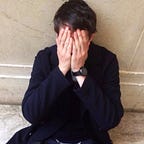Vikings’ post-secularism: fate and individuation
Unexpected as it may sound, I will miss Vikings. Now that after six years Ragnar’s saga has come to an end, it’s easier to see what the story was really about — that is to say, destiny, it’s accomplishment, and what in the last episode Hvitserk calls, half-quoting Nietzsche, “the twilight of the Gods”.
Vikings can be ascribed to the tradition of post-secular fiction, a category that is becoming increasingly important in contemporary literature and cinema (see for example Rose Harris-Birtill’s excellent work on David Mitchell’s Buddhism). God, or the Gods, are the real unmoved mover at the center of Vikings’ universe. In the show, the encounter with the Other is always mediated by the deity: your Gods think, my Gods believe. Becoming part of a new culture means essentially converting to its religion.
In the first season, Vikings are presented as the keepers of a death-cult rooted in violence and in the dark psychedelic atmospheres of their ecstatic ritual, the Ragnarök. As the story progresses, though, we learn that their system of beliefs has really more to do with life than with death: preparing for Valhalla, Vikings actively seek life at its heights, an augmented experience that reminded me several times of Erns Jünger’s account of the WWI apocalypse in his (again, psychedelic-fuelled) memoir Storm of Steel. Vikings live, love, and die with intensity. For this reason, they are epitomes of our hypermodernity — an age characterized by the enhancement of experience to Ubermensch-levels. Pseudo-fascist, maybe. Gloomy, surely not.
The underside of this hyper-life is a limited agency: as the theme song makes clear (“If I had a heart I could love you / If I had a voice I’d sing”), Vikings only partially possess personhood in the modern sense. For the other half, they are mere puppets in the hands of the Gods. Hence, reality is just partly “real”: the psychedelic undercurrent surfaces more clearly not only in the scenes of ecstatic rapture of Ragnarök but also when we realize that Vikings live life as a dream, possibly a dark dream, from which they will be awakened when they finally reach Valhalla — that is to say, with death.
Possession and limited agency bring us back to the central theme of the show, destiny. Compared to modern-day Westerners, Vikings live an existence filled with meaning, as they do everything they do to fulfill the fate the Gods have chosen for them. However, compared to their Christian rivals, they don’t just passively accept whatever life brings about, but they actively seek this fulfillment. For this reason, they look for signs everywhere, in both the inner and the outer world. They are introspective. They keep questioning themselves and their choices. When they see a sign that (they think) shows what their fate will be, they aren’t afraid to act, sometimes to the extreme consequences.
For this reason, their approach to life is so refreshing: because every day could be their last, or the moment of a life-changing discovery, or the instant when they make a fundamental step towards (or away from) their destiny. Like Jünger, they live every moment moments away from the apocalypse, the revelation. Hence, every choice is filled with meaning, the world is an endless semiotic dispositive that requires to be interpreted and acted upon. As the theme song goes, again: “I’ll see what tomorrow brings…”
Vikings’ post-secularism, therefore, turns out to be Jungian at heart: the way forward is the way inward, self-realization is the same as self-individuation. Your fate is to became who you have always been and to accomplish it is your uttermost responsibility.
In Vikings life and death aren’t really opposites. They are moments of an eternal cycle in which our individual selves arise, form, and dissolve. Our life is just a blink right before the twilight of the Gods. But in that brief moment, so short one could think it’s nothing more than a dream, we are tasked with the biggest of tasks: find out who we are.
In the last scene of the series, we see Floki and Ubbe looking at the sunset from a Canadian beach. “Is this the end?”, asks Ubbe. Floki, now turned into the Viking version of a Zen master, doesn’t reply. And what could he really say? The sun will set, the sun will rise again. Tomorrow could be the last of our days or the first of our new life.
“I’ll see what tomorrow brings…”
“I’ll see what tomorrow brings…”
